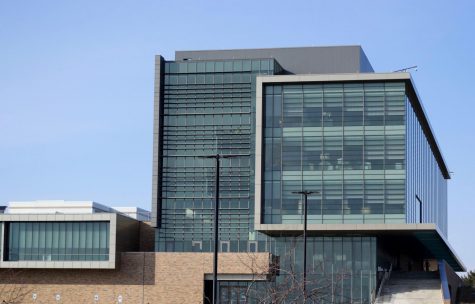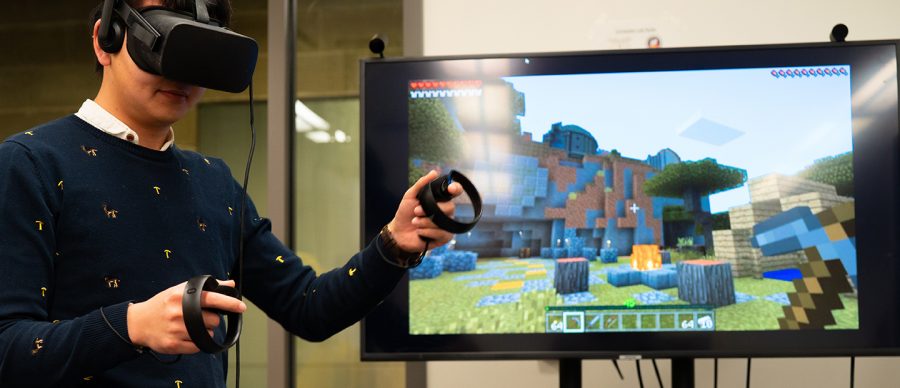Augmented Reality Center gets founding members
Photo Courtesy of Oakland University
A student tries out virtual reality while playing Minecraft. Oakland’s School of Engineering and Computer Science will be adding an Augmented Reality Center (ARC) into its building.
The School of Engineering and Computer Science will be adding an Augmented Reality Center (ARC) into its building, which will provide opportunities for students and faculty.
Augmented reality is somewhat similar to virtual reality, but it’s more immersive.
“Let’s say you’re wearing clear glasses and you’re seeing the whole world in front of you. Suddenly you see an object on your table, it’s not there in real life, it’s a virtual object in your real world that’s acting like a real object,” Khalid Mirza, founder of ARC, said.
Augmented reality is useful for new employees when doing their training, and is a new approach to absorbing and applying new information.
Oakland University, the College for Creative Studies, and a coalition of regional industry partners have joined forces to establish this space. The collaboration with the College for Creative Studies will allow the user interfaces experience to be optimal.
The industry partners include ABB Inc., AM General, Continental, General Motors, Hirotec America, KUKA Robotics, Magna International, MAHLE Industries, Rave Computer, Siemens and US Military Ground Vehicle Systems.
The main partner is Epic Games, the video game company most known for the 2018 viral sensation, Fortnite.
They’re giving support through

their Epic MegaGrants Program, a $100 million initiative designed to service and assist game developers, enterprise professionals, media and entertainment creators, students, educators, and tool developers doing outstanding work with Unreal Engine or enhancing open-source capabilities for the 3D graphics community.
“They’re [Epic Games] going to use whatever they’re doing in games in the industry and it makes sense to everyone to include them,” Mirza said. “There’s an area that is going to develop most cost effective hardware, most eye popping software interfaces. We can use this for industrial applications — it just makes sense.”
The center is going to be in an immersive lab, showcasing engineering, science and art.
Students will engage with and explore augmented reality (AR), virtual reality (VR) and their applications.
Workshops are going to be available for students to learn about AR and the applications and other workshops to learn about how to use it in their facilities to prepare for Industry 4.0.
Industry 4.0 is the ongoing automation of traditional manufacturing and industrial practices using modern “smart” technology, according to OU News.
The ARC will be collaborative, where industry partners and companies, faculty and students can engage, learn and partner on emerging technological advancements.
“I can imagine a demonstration where everyone is wearing a headset and they see virtually all the same object and can interact with it together,” he said.
ARC was created with the support and expertise of an Industrial Advisory Board (IAB) and OU faculty to provide a learning platform where engineering and art intersect.
The center is still in development and has yet to announce a launch date.
“We’re figuring out things as we go along,” Mirza said. “There’s so many possibilities, and it opens doors for things that we haven’t tried before.”
The center will be open to students, faculty and staff, along with visitors. More information can be found on their website.










